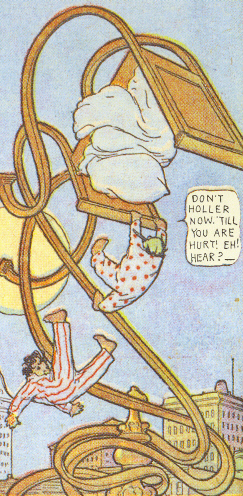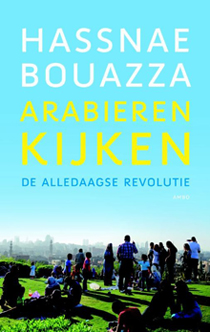Europe Needs Its Own Koizumi
Angel Ubide

Only a few years ago leaders of the European Union bubbled with confidence about their economic future, and Japan looked like a lost cause. Now, as Japan’s recovery gains momentum, some forecasters expect its economy to grow faster than 3 percent, or faster than Europe and the United States, in 2006. It’s time for Europe to ask what it can learn from Japan. The answer: a lot.
The first lesson is that timing is everything. Japan got reform right by cleaning up its debt-burdened and politically connected banks first. A more independent and vibrant financial sector forced corporations to streamline, and to press reforms on workers, including an end to promises of lifetime employment. Yet there was no popular revolt, because the emerging recovery was bringing Japan back, making reform respectable. In Europe, where leaders first pushed labor and welfare reform, the result has been no improvement in growth, and massive street protests against declining benefits and job security.
The second lesson: it’s the politics, stupid. Prime Minister Junichiro Koizumi has transformed his ruling Liberal Democratic Party from a coalition of powerful factions defending conservative rural interests into a modern party bent on reform. Europe, meanwhile, remains caught in a political trap, as powerful interest groups defend an inefficient system: farmers fight for massive agricultural subsidies; older workers for generous pensions.
The seeds of Japan’s recovery lie in Koizumi’s decisive moves to cut the government-backed ties between banks and their corporate clients. This made it clear to companies that they had to reform or die. Thousands of zombie companies closed down. Excess capacity was eliminated. The result is an increasingly broad-based recovery, with wages rising alongside employment, and the strongest labor income growth since the late 1990s. The improving labor market is anchored by rising corporate profits, with margins at historic highs. Stronger income growth is mirrored in a U-turn for asset prices. Stock prices have doubled from the lows of early 2003. Land prices are rising in large cities. The consumer price index is starting to edge higher, signaling the imminent demise of deflation.
Koizumi capped this revolution by fighting the September 2005 general election on his promise to privatize Japan’s post officewhich is also the world’s largest bank, with $3 trillion in Japanese savings. By winning big on this issue, Koizumi proved that economic reform could be popular. Meanwhile, European leaders, by talking grandiosely but failing to deliver, have generated “reform inflation,” devaluing the whole concept of reform. In Japan, reform is good; in Europe, it’s stigmatized.
Ironically, the European approach to reform was designed to work as Japan’s has. The European bureaucracy was supposed to defend reform against national politicians’ catering to special interests. The process of creating a single market was designed to slowly but surely eliminate inefficiencies, and opposition. The European Central Bank and the adoption of the Growth and Stability Pacta cap on national budget deficits at 3 percent of GDPwere supposed to ensure that nations got the macropolicy right. They have not. Today, the squabbling over the E.U. budget, which focuses on which interests will win and which will lose, shows how deeply Europe remains stuck in old-fashioned politics.
Perhaps the key for Europe now is to change the timing of reform. European nations have tried numerous labor-market and social-security reforms, some liberalization of trade in goods and services, and little financial-market integration. The sequence should have been precisely the opposite. Stronger financial markets could drive national reforms, force liberalization in goods and services markets, and make labor-market reforms unavoidable.
Specifically, European leaders need to move faster on the EU action plan to open up financial markets, and they need to eliminate lingering inefficiencies at the national level. They should allow cross-border mergers of banks in France, Germany and Spain, which would integrate the Continental market, lower prices and increase market pressure on the corporate sector to become more efficient. They should create a Europe-wide market in which fixed-rate mortgages can be refinanced easily and cheaply, allowing consumers to tap their home equity for consumption. An integrated financial market would make monetary policy more effective, by speeding up the impact of interest-rate changes, and lift Europe’s growth rate. As Japan has shown, recovery can make tough reform popular. What Europe lacks most is a Koizumi to make it happen.
Angel Ubide is a fellow at the Center for European Policy Studies in Brussels. This article was published first in the april 3 issue of Newsweek.
Algemeen, 08.04.2006 @ 15:44
10 Reacties
op 12 04 2006 at 16:43 schreef Elke:
Die opmerking over timing van hervormingen, om de hervormingen niet de lading van afpakken van verworvenheden maar ze de respectabiliteit van de vooruitgang mee te geven, kunnen we ons aantrekken, denk ik.
Een pleit voor een soort anticyclisch economisch beleid, iets Keynesiaans?
Verder vraag ik me heel erg af, of je de Japanse samenleving wel helemaal met de Westerse kan vergelijken.
De grondslagen ervan zijn van volkomen andere aard, en de reacties ervan denkelijk ook.
op 16 04 2006 at 12:59 schreef Osamu:
I’m living in Tokyo. I read this article on Newsweek mag. First of all, I’d like to say thanks for praised Japanese Prime Minister Koizumi. However, this article misunderstands Japan and Japanese economy. I think that a recovery of Japanese economy is trickery by the Japanese government. Only a few companies are mentioning good achievements. But a majority of Japanese company is not. After WWII, the Japanese people believed that Japan is equal society during this half-century. Today, Koizumi’s neoliberalism policy made a large scale of unemployment and income differential. Most of Japanese people do not feel that Japan recovered.
The prosperity of Japanese economy is based on demand from China and other countries. But Koizumi’s foreign policy is making superfluous friction between Japan and China. He is a diplomatic trouble maker.
So, I think Europe does not need Koizumi.
op 16 04 2006 at 16:55 schreef Peter Breedveld:
Hello Osamu, you sound like a Japanese anti-globalist, are you?
You say only a few Japanes companies are reporting good achievements, but if that would be the case, there would be no reason to expect a growth of more than 3 percent of the economy, would there?
Also, the increase of unemployment in Japan is really a result of the ‘bubble economy’ of the eighties, isn’t it? Irresponsible investments in real estate, that kind of thing?
Are you saying Japan should not compete with China because that might cause some friction between the two countries?
op 17 04 2006 at 04:53 schreef Mike Ross:
Peter,
Osamu is as liberal as you can get without being "red"… He is anti-Koizumi and he is anti-Bush, to the point that any "good" news must be slanted and any "bad" news must be projected.
The Japanese economy is growing. The stock market is booming. Some may call it a "bubble", but the fundamentals of the market says its a strong recovery based on sound economics.
Japan is part of the global economy. It is benefiting from the bubble in China. It is benefiting from the strong economy of the US.
What Japan needs to do next is tax reform that will return the tax burden on all. In the current system the top 40% probrably pays over 95% of the tax. This system was put in place so that the policies during the recovery will not affect the regular worker. Now that the economy is moving forward, the red ink of the government needs to be delt with.
MikeRossTky
op 17 04 2006 at 11:12 schreef Peter Breedveld:
How did you guys find this site? Anyway, a warm welcome to you.
It’s been a while since I busied myself with Japan. I actually studied Japanese, its economy and its foreign relations in the early nineties. Judging from your site you are some kind of Japanologist yourself, Mike.
The reason Europe needs a Koizumi, and needs it very much, is that huge amounts of taxpayer’s money flows into sectors of the economy that hardly have any right to exist, not in the current size it is today anyway. The agricultural sector, for instance. But politically it’s hardly possible to put an end to the irrational spending, mighty France being one of the largest consumers of European agriculturual subsidies.
We need a daredevil to put and end to that.
But that’s just me dreaming.
op 18 04 2006 at 15:07 schreef Mike Ross:
Peter,
I think Osamu found you through by searching your name after reading the newsweek article. I followed the link he provided in his blog. I’ve known Osamu since the early days of Internet….
I’m a strange foreigner. I was born and raised in Japan. Went to college in the US and returned about 7 years ago to Japan and now have Japanese citizenship. So I’m not sure you can call me a Japanologist.
Major reform is needed in Europe. 65% tax in Belgium. High unemployment rates. Underfunded entitlements. Quality that is declining.
I can not see myself investing any of my personal money in a European fund on the long run.
Koizumi-like politician or even a Bush-like politician will be good for Europe. But the elite that controls the politics will not support such a politician in the media.
We both need to keep dreaming. But if you see anyone like that take power, drop me a note, I will change my money market fund from Japan/China to Europe. I can’t keep getting over 25% return in these two funds forever.
MikeRossTky
op 18 04 2006 at 21:43 schreef Cor:
‘I can not see myself investing any of my personal money in a European fund on the long run.’
A wake-up call for Europe indeed!
What about US money marked funds?
op 21 04 2006 at 17:32 schreef Mike Ross:
Actually my US funds are doing about 25% over the past 3 years, so I’m quite happy with it. The tax rate cut, which has strengthened the economy (and at the same time increased revenue for the government which the US Congress seems to have spent most of it…) has put money in my pocket.
The way I see it, US MMF will do good until election years. Japan will keep doing well over the next 3 years and China will do well at least up to the Peking Olympics.
MikeRossTky
op 23 04 2006 at 11:06 schreef Shah Alexander:
Osamu introduced this post to Mike and I. Fundamentally, I agree with the author, though I feel she over-evaluates Koizumi. Certainly, Japan needs a reform, and Koizumi is the one who initiates real changes. However, it is true that his reforms are too business- oriented, which destroys social safety nets.
As to China, I agree with Osamu that excessive dependence on its market is dangerous. I am saying this as a Japanese neocon, not as an anti-globalist. China is on the path to become a Kaiser’s Germany in this century.
Koizumi may be one of the candidates, but I would recommend Tony Blair for Continental Europeans. His economic policy is pragmatic, and his foreign policy serves global interest.
I publish English and Japanese blogs. I shall appreciate your stop by on my site. You will understand why I call myself a Japanese neocon.
op 23 04 2006 at 11:06 schreef Shah Alexander:
Osamu introduced this post to Mike and I. Fundamentally, I agree with the author, though I feel she over-evaluates Koizumi. Certainly, Japan needs a reform, and Koizumi is the one who initiates real changes. However, it is true that his reforms are too business- oriented, which destroys social safety nets.
As to China, I agree with Osamu that excessive dependence on its market is dangerous. I am saying this as a Japanese neocon, not as an anti-globalist. China is on the path to become a Kaiser’s Germany in this century.
Koizumi may be one of the candidates, but I would recommend Tony Blair for Continental Europeans. His economic policy is pragmatic, and his foreign policy serves global interest.
I publish English and Japanese blogs. I shall appreciate your stop by on my site. You will understand why I call myself a Japanese neocon.






 RSS
RSS